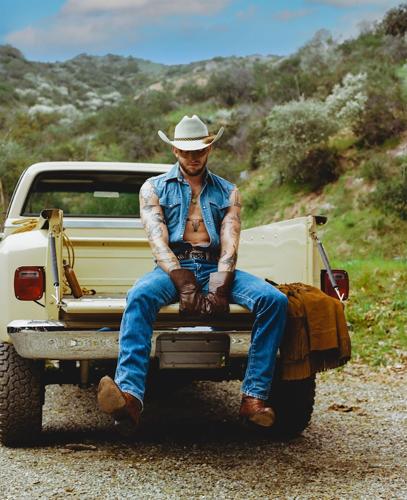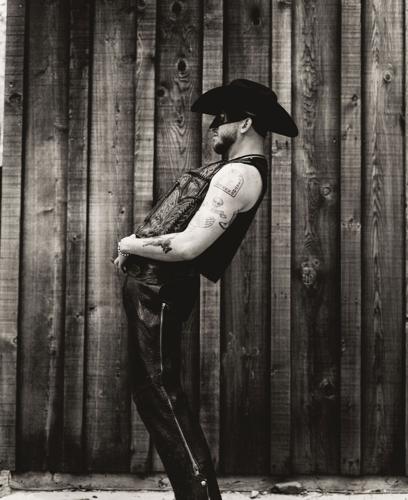
Orville Peck
Nashville is a city with a lot of closets, and we’re not just talking about empty luxury apartments proliferating wherever a venue, restaurant or funky tradition threatened to become just a bit too beloved. But there is a residual kayfabe to show business when it comes to queerness — an unspoken détente that accepts showmanship and flamboyance in the context of performance. Liberace, Johnny Mathis, Jim Nabors, Barry Manilow — again and again we find examples of beloved gay performers who were allowed to coexist with the traditional fame track, cultivating audiences who would happily vote against their interests but who didn’t dig too deep or ask too many questions as long as they were sufficiently entertained.
So in that respect, Orville Peck’s creation and curation of himself and his iconography serves as an indictment of that mentality. It’s not a gimmick — it’s a signifier of suppressed rage. It is very much in keeping with his punk rock roots, and it also allows inquisitive zoomer fans a pathway to discover the history of how mainstream industries run on queer energy.
Respect is due Peck’s process, refining his look and media presence with each successive release, reworking his mask and making his ongoing arc of revelation into something that suffuses his records even as it also becomes something tactile, observable from the outside and concrete. The dulcet baritone hits you in the solar plexus first thing, an Eddy Arnold cattle call and Barry White bedsheet serenade at the same time — multiple-level odes to sweaty balls.
That voice is one for the ages, conscious of what it must represent in the modern country game and steeped in a sincerity that tangles in the spine and sets off the artist’s wry sense of humor in a way that disarms the listener. The mask, inescapable, is a fascinating conversation piece, as well as an undeniable reminder about the legacy of queer artists in all manner of Nashville musics. Patrick Haggerty of Lavender Country and k.d. lang blazed trails but were shut out of the traditional country game. Others did their best to play along but either got dragged out of the closet or, more often, stayed there and calcified. As with lang, Peck’s Canadianness (he is also of South African descent and spent much of his childhood there) served as a bit of a deflector shield for knee-jerk corporate countrythink, and thankfully, the passage of time has mellowed things somewhat. Plus, Peck has made a point of spreading the attention he’s been getting around, playing nice with genre pollination and keeping the guest list vibrant.
The blessings of Saint Kylie Minogue, the Tom of Finland Foundation and Elton John should make things very clear: Peck is a major queer voice in contemporary music generally and country music specifically. His cover of “Rhinestone Cowboy” with TJ Osborne, Fancy Hagood and Waylon Payne is the queer country equivalent of that remix of Craig Mack’s “Flava in Your Ear,” and that’s just one track on his current album Stampede, a heaping serving of smart duet pairings and excellent song selection. (Personal fave: the Nathaniel Rateliff collab “Conquer the Heart.”) And “Papa Was a Rodeo” was always late, great Scene editor Jim Ridley’s favorite Magnetic Fields song, and Peck’s take on it with Molly Tuttle and Golden Highway is similarly exquisite.

Orville Peck
Which brings us to Orville Peck’s Sixth Annual Rodeo, a multinight, multivenue extravaganza with all manner of guest appearances and enough queer energy to power the whole city. The event draws from multiple disciplines and Nashville voices to create the kind of continuum-spanning experience that speaks to the strengths of diversity and makes the small-minded deeply nervous. Friday’s kickoff at The Basement East — with the aforementioned Hagood as well as Bad Girl Bible and Monday Night Football diva Reyna Roberts and drag artist Alexia Noelle Paris — had already sold out by print deadline, with the other two evenings getting close to doing so as well.
Saturday at Ascend Amphitheater promises living legends Tanya Tucker and John Waters (!); CMA, Grammy and CMT Award nominee Mickey Guyton; onetime MTSU student Medium Build; and Goldie Boutilier, who’s finding her way from EDM to a path of more traditional instrumentation. And then Sunday at Brooklyn Bowl offers indie queen Marci, rawk rapscallions The Nude Party and masters of the beat Sparkle City Disco.
What this tells us is that Peck has a gift for putting together shows like assembling a quality dinner party: maximum variety and vibe that grabs hold of the audience, finds their groove and plays their song. It’s going to be the kind of queer extravaganza that shines all manner of lights into all those many closets — a pulsating iridescence to show that Nashville isn’t just decades of hollow shells built on empty aspiration, but rather a beacon of heartfelt hooting and hollering in the face of empty-headed contempt. Set your faces to stunning.










